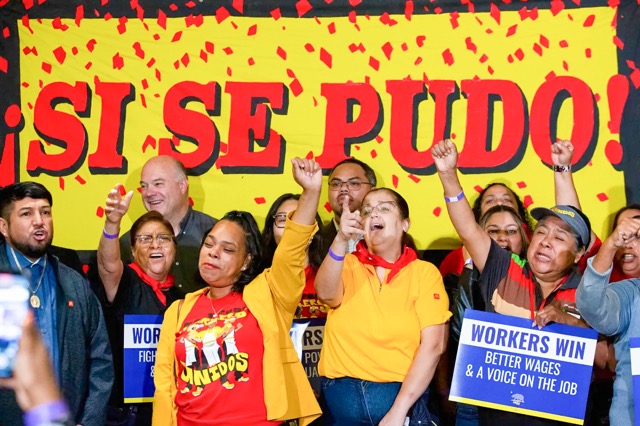Prop. 32
BY JEANNE KUANG, CalMatters
A ballot proposition to raise California’s minimum wage to $18 an hour has been rejected by voters, even as the state continues to grapple with its high cost of living.
The Associated Press called the race Tuesday after two weeks of ballot counting. Nearly 51% of voters said “no” in a rejection that opponents on Monday called “historic.”
Proposition 32 would have raised the state minimum wage to $17 for the rest of the year, and then $18 in January for large employers. Smaller employers — those with 25 or fewer workers — would have been required to pay at least $17 in January and at least $18 in January 2026.
The state’s minimum wage is already tied to inflation: The lowest-paid workers will still get a 50-cent raise to $16.50 in January. For a full-time worker, that’s a little more than $34,000 a year.
The measure would have given California the highest state minimum wage in the nation. Supporters estimated it could give raises to about two million Californians who work in such industries as warehousing, restaurants, agriculture and childcare.
But with a quieter than usual campaign in support and widespread voter frustration over inflation this election, the measure was doomed after business groups pushed back by claiming the wage hike would drive restaurant and grocery price increases. Prop. 32’s fate could signal how liberal California’s electorate remains on economic policies as the cost of living continues rising.
“Voters know who pays for wage mandates like Proposition 32 — they do,” Jot Condie, president of the California Restaurant Association, said in a statement. “They’re sick of the high cost of living and they are clearly associating California’s laws and mandates as significant contributors.”
While the state has boosted pay for hundreds of thousands of low-wage workers in recent years and likely voters indicated last year that they support raising the state minimum wage to $18, recent polling showed Californians split on the measure.
Supporters said they would keep trying to raise the wage.
“We’ll continue until every California worker earns enough to live and thrive,” proponent Joe Sanberg, a startup investor and anti-poverty advocate, said in a statement. “While today’s outcome was not what we expected, we are hopeful for the work ahead.”
But labor unions, which in 2016 pushed heavily for the increases that led the state to a $15 minimum wage in 2022, are taking a different approach.
“Although we always support raising wages, this wasn’t Labor’s initiative and we played no role in the campaign,” said Lorena Gonzalez, leader of the California Labor Federation. “Our current focus is to help unionized workers collectively bargain wage increases and to provide a path to unionization for those workers who don’t currently have one.”
What do supporters say?
The ballot proposition was sponsored by Sanberg and backed by labor unions, progressive groups and the California Democratic Party. Supporters argued the state’s lowest earners needed a boost to afford housing and other basic needs.
As the measure trailed after Election Day, supporters doubled down on arguing that raising the minimum wage is a form of economic populism.
“Of all the ballot measures that progressives were organized around, I have the most hope for Prop. 32,” said California Working Families Party leader Jane Kim. “This is our opportunity to actually provide real solutions to the economic woes people are facing.”
What do opponents say?
Prop. 32 was opposed by the state Chamber of Commerce and business groups representing the grocery, agricultural and restaurant industries.
Business owners argued mandating pay hikes would increase food prices and worsen inflation, seizing on those concerns during a year when American consumers have remained pessimistic about the economy, despite inflation falling steadily from a pandemic-era peak.
Why is it on the ballot?
Prop. 32 had an unusual path to the ballot. It didn’t come from the usual players in labor politics — the unions that dominate the California Democratic Party and command strong support in the Legislature. Unions were instrumental in 2016 in striking a deal with lawmakers and then-Gov. Jerry Brown to mandate a series of wage hikes that brought the state’s minimum wage up to $15 in 2022.
Instead, Sanberg personally poured $10 million into qualifying the measure. When he announced the measure late in 2021, a hike to $18 appeared ambitious. But by the time the proposition made it to the 2024 ballot, California unions and lawmakers had already outpaced it.
A $20 minimum wage for fast food workers went into effect this April. The healthcare industry in October also began raising pay for a scheduled minimum wage hike to $25. Los Angeles hotel workers are seeking a $30 minimum wage by the 2028 Olympics.
For everyone else, the state minimum wage continued to rise with inflation, reaching $16 this year.
Supporters said those left behind still deserve to earn more. According to researchers at MIT, a single Californian with no children needs at least $27 an hour to be self-sufficient.
But with far fewer workers in line for a raise under Prop. 32, the campaign for the measure was met with less fanfare and public support than initially envisioned. Union leaders, while backing the measure, said $18 can hardly be considered a living wage in California today.
Sanberg and proponents have said the measure is simple and attractive enough to most voters that they did not need to blanket the state with ads or spend big on a formal campaign. But in the final weeks of the election, as polling showed its chances of passage falling, they said they’re reaching out to working class voters and those in big cities, to turn out likely supporters.
For More California News Visit www.zapinin.com/california-news

For More Visit www.zapinin.com/california-news

